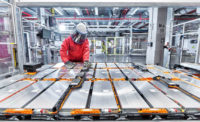WOLFSBURG, Germany—The Volkswagen Group plans to build six large battery factories in Europe by the end of this decade. The “gigafactories” will have a total capacity of 240-gigawatt-hour (GWh).
The first two facilities will operate in Salzgitter, Germany, and Skellefteå, Sweden. Both factories will be powered with electricity from renewable energy sources. Potential sites and partners are currently being considered for the other factories.
“[We are] pushing ahead at full speed with the development of production capacities in Europe in order to meet the increasing demand for battery cells,” says Thomas Schmall, CEO of Volkswagen Group Components. “Together with partners, we want to have a total of six cell factories up and running in Europe by 2030, thus guaranteeing security of supply.”
In response to increased demand, Volkswagen has decided to concentrate production of its premium battery cells in the Swedish factory is operates in collaboration with Northvolt. The production of these cells is set to commence in 2023 and will be expanded gradually to an annual capacity of up to 40 GWh.
“[Our] gigafactory in Salzgitter will produce the unified cell for the high-volume segment from 2025 and develop innovations in process, design and chemistry,” explains Schmall. “Production capacity of up to 40 GWh per year is also planned for Salzgitter. This refocusing will deliver enhanced economies of scale and reduce the complexity of production.
“We aim to reduce the cost and complexity of the battery and at the same time increase its range and performance,” Schmall points out. “This will finally make e-mobility affordable and the dominant drive technology.
“Aside from the planned in-house production, significant cost benefits are expected primarily thanks to the new unified cell,” claims Schmall. “Further savings will be delivered by optimizing the cell type, deploying innovative production methods and recycling.
According to Schmall, Volkswagen’s goal is to gradually reduce battery costs in the entry-level segment by up to 50 percent and in the volume segment by up to 30 percent.
“We will use our economies of scale to the benefit of our customers when it comes to the battery, too,” says Schmall. “On average, we will drive down the cost of battery systems to significantly below €100 per kilowatt hour.”



